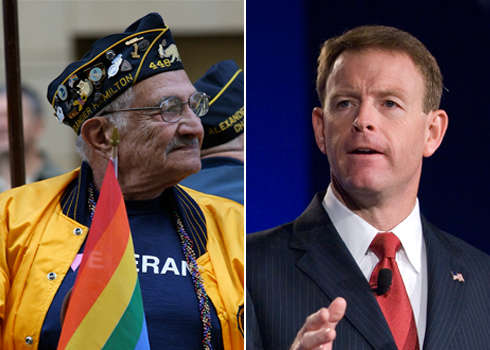In its bid to block the repeal of Don’t Ask, Don’t Tell, the Family Research Council is arguing that soldiers could get HIV if gay men and lesbians are allowed to serve openly — and that kids might read porn instead of the Bible. In a 98-minute Webcast caught by the LGBT POV blog, FRC’s Tony Perkins promised to explain, “How the military is being used to advance a radical agenda.”
Perkins began the webcast (watch it in full below) with a warning: “What you will see and hear tonight may enrage you.” The broadcast included Oliver North, Sen. Jim Inhofe (R-OK) and Rep. Todd Akin (R-MO). FRC has been campaigning adamantly against the repeal of the Clinton-era ban on gays in the military.
Appearing in the video with the spurious claims about HIV was Dr. Robert Labutta, described by Perkins as a former Army physician who had earned the rank of colonel. He’s currently a neurologist in Washington. Labutta told Perkins that gays are “at a significant medical risk” and have an increased risk of HIV, sexually transmitted diseases and “psychological disorders.”
Perkins notes that troops with AIDS aren’t allowed to be deployed, “so that obviously affects military readiness.” He asked, “But what about the health implications for other soldiers, say, on the battlefield?”
Labutta’s response:
The individuals who are HIV positive cannot deploy. They have no duty restrictions but they have to be assigned to the United States or its territories and they’re not able to deploy. So they are in a nondeployable status and cannot have oversea assignments.
Perkins said, “I mean, that obviously creates a problem for the military if this were to be an expansion of those that have this condition.”
Labutta:
Absolutely. I think the other thing to look at is that those people who have homosexual behavior have an increased risk – or, increased utilization of health care (sic). They have an increased incidence of sexually transmitted diseases. They have an increase – almost three times the incidents of mood disorders and other behavioral disorders like anxiety, major depression, even substance abuse.
Labutta said that the safety of the blood supply could be questioned but it also could put soldiers at risk in the barracks if “someone falls, someone gets a cut, a bloody nose, those kinds of things, where the first responder is usually the person who puts their hand over that which is bleeding.”
“So those – the people without HIV would certainly be at an increased risk as it would be likely that the number of people with HIV in the military would increase. There’s no reason to expect that would not occur,” Labutta said.
Neither mentioned that straight soldiers could also be carrying HIV.
North said President Obama is giving in to his “most radical constituents” who advocate for gay rights. He said people who want to end Don’t Ask, Don’t Tell “don’t care about wrecking the finest military the world has ever known.”
But it was this line from North that caught our eye:
I’ve seen these kids who come from a background of either home-schooling or Christian education who come into the military and they take out a copy of the good book, instead of porn, when they’re out there on a mission. Now, those youngsters are not going to come into a military where they’ve been told, by order, that homosexuals can come in. Moms and dads are not going to encourage their youngsters to come. So immediately, it will affect recruiting.
Watch the whole video below:
Late Update: Asked for a response to the Family Research Council’s claims, Pentagon spokeswoman Cynthia Smith said the military’s current HIV policy remains in effect. Here’s that policy, which basically calls for screening every two years for all active duty members.
All members of the Armed Forces shall be screened periodically for serologic evidence of HIV infection.
Active duty (AD) personnel shall be screened no more or less than approximately every 2 years unless clinically indicated.
Reserve component (RC) personnel shall be screened when called to a period of active duty greater than 30 days if they have not received an HIV test within the last 2 years.
Members of the Selected Reserves (SELRES) shall be screened at least once every 5 years.Members with serologic evidence of HIV infection shall not be retired or separated solely on the basis of serologic evidence of HIV infection.
AD members with serologic evidence of HIV infection determined to be fit for duty shall be allowed to serve in a manner that ensures access to appropriate medical care.
Military personnel with serologic evidence of HIV infection shall receive training on the prevention of further transmission of HIV infection to others and the legal consequences of exposing others to HIV infection.






